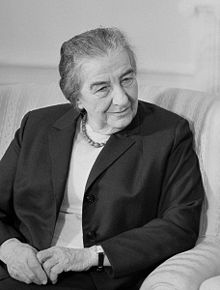Golda Mabovitch (1898-1978) was born in Ukraine and moved with her family to Milwaukee when she was 7 years old. A leader from her youth, she raised funds to pay for her classmates’ textbooks while in elementary school, and ran her parents’ grocery store in their absence. At 14, Golda rebelled against her mother’s wishes to abandon her studies and get married. Instead, she fled to Denver to live with her older sister. There she was first exposed to Zionism, and met her husband Morris Meyerson, from whom she took the last name, later shortening it to Golda Meir. She only married him with the promise that they would move to Israel. After working as a teacher for a few years, Meir finally made aliyah in 1921, joining a kibbutz where she worked on farms and chicken coops. Recognizing her leadership, the kibbutz appointed her their representative to the Histadrut (Federation of Labour). Meir rose through the ranks, eventually becoming head of the Jewish Agency and chief negotiator with the British Mandate. In 1948, she single-handedly raised $50 million for Israel to purchase arms in the wake of war. Ben-Gurion famously said that this was the money that “made the State possible”. She was one of 24 signatories of the Declaration of Independence, and the first person to carry an Israeli passport. Meir served as Labour Minister, and then Foreign Minister, until retiring in 1966 due to lymphoma. But she came back three years later, aged 72, to become Israel’s Prime Minister. She was Israel’s “iron lady” during the Yom Kippur War, maneuvering a victory against all odds. Nonetheless, she took the blame for the war and resigned. She succumbed to lymphoma shortly after. A winner of the Israel Prize, and voted to the list of greatest Israelis, her maxims are often quoted. Meir once said: “Pessimism is a luxury that a Jew can never allow himself.”
Words of the Week
Ten measures of speech were given to the world, and nine of them were granted to women.
– Talmud, Kiddushin 49b

